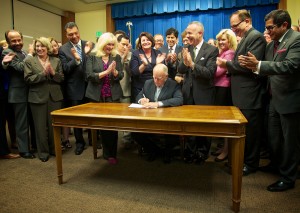
After a marathon political process in Sacramento, a decision was finally made to address the state’s water needs. State legislators agreed last week on which of the many proposed water bond measures would be considered by California voters in November.
Governor Edmund G. Brown Jr. signed legislation last Wednesday to put a comprehensive $7.5 billion water bond before voters that includes $2.7 billion for new water storage, including water storage facilities in the Central Valley. The bond would also provide more than $520 million in critically needed drinking and wastewater treatment projects for communities that cannot currently drink from their own taps.
“Water is the lifeblood of any civilization and for California it’s the precondition of healthy rivers, valleys, farms and a strong economy,” said Brown. “With this water bond, legislators from both parties have affirmed their faith in California’s future.”
Assembly Republican Leader Connie Conway, of Tulare, also announced her support for the new ballot initiative.
“I am pleased that the legislature today was able to come together and reach an agreement to place an alternative water bond before the voters this November,” she said. “Today’s vote comes after nearly a decade of complex and often-difficult negotiations among many different stakeholders. I want to commend all the different parties for their hard work in reaching consensus on a water bond.
“Throughout the process, Republicans made it clear that the most important component of any water bond proposal must be storage,” she continued. “We successfully fought back against efforts to shortchange funding for critical water storage projects. If Republicans had not stood firm in fighting for more storage, this funding would likely have never materialized and we would be faced with more ‘Band-Aid’ fixes to our severe droughts.
“As a result of strong Republican leadership, Californians will now have the chance this November to cast a ballot on a long-overdue water bond that will help meet our statewide water needs and provide a secure reliable water supply for millions of Californians for generations to come.”
The legislation, AB 1471 by Assembly Member Anthony Rendon (D-Lakewood), replaces the current $11.1 billion water bond on the November ballot. The bipartisan legislation passed the State Senate 37-0 and the State Assembly 77-2. The new bond includes $7.12 billion in new debt, plus the repurposing of existing unspent bond funds of $425 million for a total of $7.545 billion. None of the repurposed bond funds will be taken from existing projects.
The measure will be Proposition 1 on the November ballot.
The water bond measure decision was also well received locally.
“I applaud the hard work and dedication of Assembly Members Connie Conway and Henry Perea and Senator Andy Vidak in leading the legislature in an effort to strengthen a bond proposal that we feel was previously incomplete,” said California Citrus Mutual President Joel Nelsen. “To the governor’s credit, he and his team listened to stakeholders and came a long way from the $2 billion for storage that was included in his original proposal to a more comprehensive package that addresses our Valley and the state’s needs for a real solution.
“We have more money for storage, a path towards cross valley connectors, and funding for groundwater cleanup in disadvantaged communities,” he added. “The previous proposals contained less money, no pathway for the connector, and in reality made too few happy. This is a positive step forward and I believe the speaker and the governor when they say we will work together to achieve all our goals.”
Now it’s up to California voters, which may be a challenge. Two recent public opinion polls commissioned by Association of California Water Agencies, the California Alliance for Jobs and The Nature Conservancy were conducted back-to-back by JMM Research, from July 28 through August 4.
A key finding of the polling indicates that, while the state’s prolonged drought has increased voter concerns about the availability of water supplies, voters are nevertheless cautious about how much the state should obligate itself in new bond spending to improve and upgrade water facilities.
